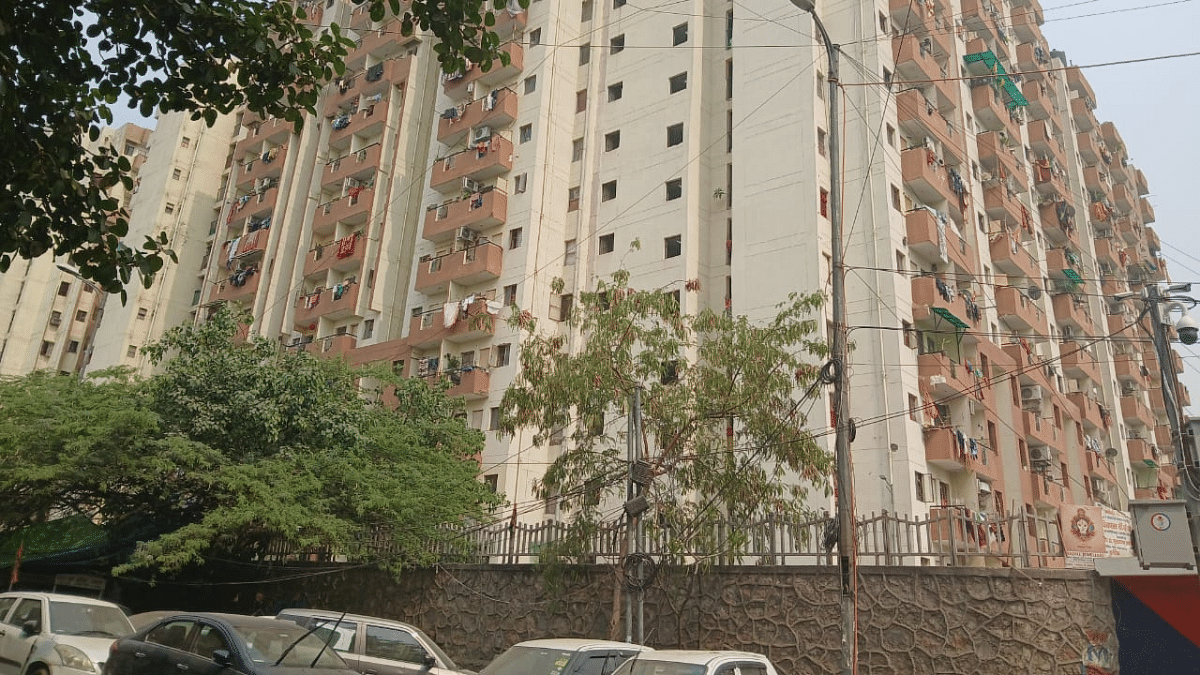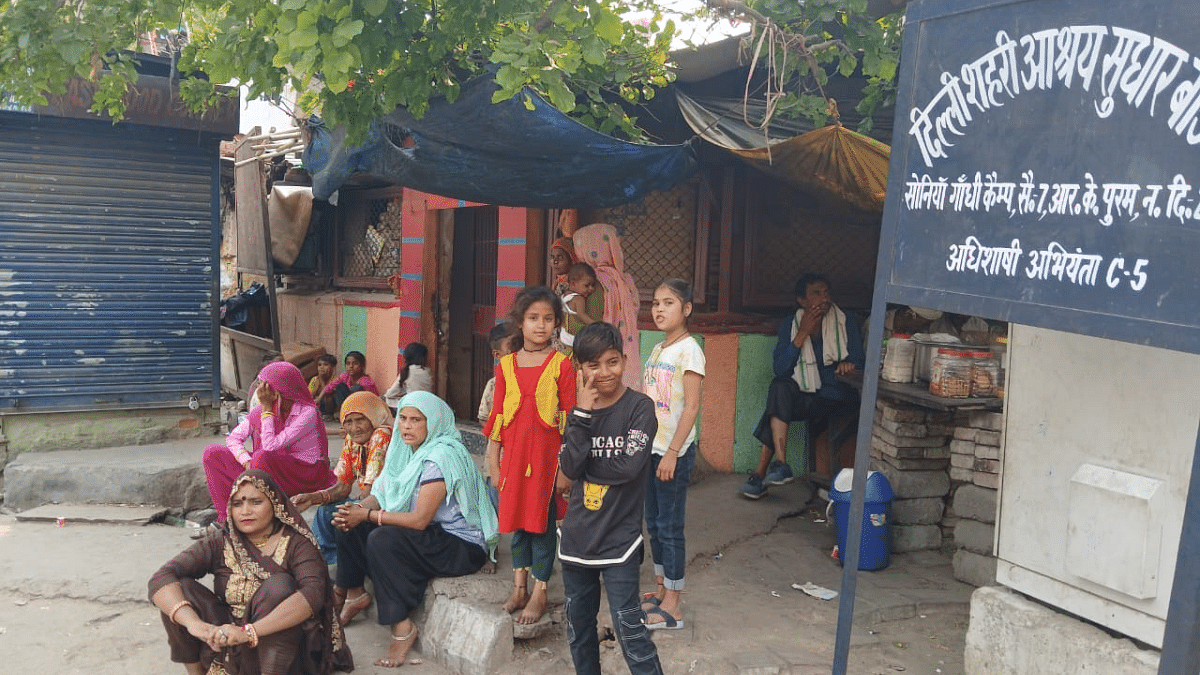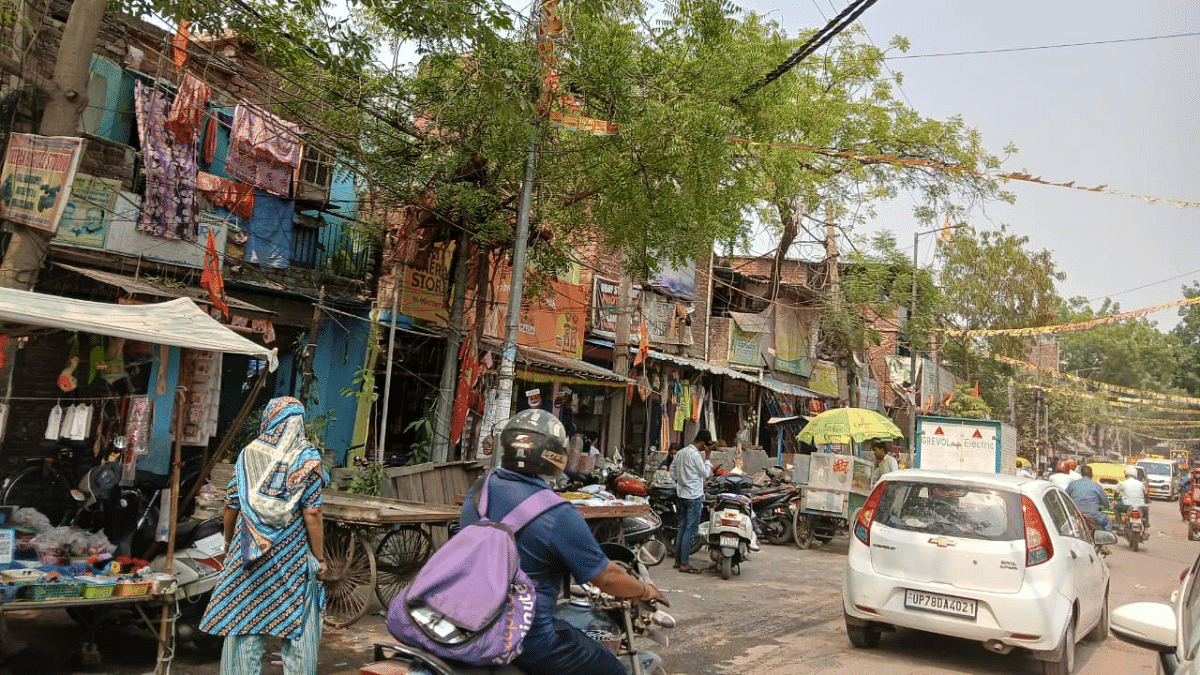New Delhi: The 14-storey DDA housing complexes in south Delhi’s Kalkaji Extension and north Delhi’s Jailorwala Bagh are at the centre of the Bharatiya Janata Party’s campaign in slum clusters for the Lok Sabha polls in the city.
The BJP is showcasing these as the Modi government’s commitment to deliver on its promise of ‘Jahan Jhuggi, Wahin Makan’, as flats have been allotted to over 3,600 families living in slums at these two complexes in the past two years.
As Delhi prepares to vote 25 May, the BJP is hoping to garner the support of slum clusters, considered a strong Aam Aadmi Party (AAP) support base, to counter the AAP-Congress alliance in a direct contest to win all seven seats for the third consecutive time.
In the densely populated slum clusters — 675 of them with over 15 lakh people — people say that they have benefited from the AAP-led Delhi government’s free water and electricity schemes. The AAP’s welfare measures, including mohalla clinics and improving school infrastructure, gives the party an edge among the lower income groups.
Sitting outside her two-room house in Navjeevan camp (a slum cluster) in Kalkaji Extension, Bindu Devi, 34, says, “We need a flat, but it is not the most important thing as we already have a house here. But it is water and other benefits that matter a lot to people here, as it impacts us on a day-to-day basis.”
The narrow lane leading to her house is dotted with blue-coloured containers to store water. She added, “In the past 10 years, things have improved a lot in the cluster. Now, there is no water problem and free electricity has helped us save thousands of rupees annually.”
In March, the Kejriwal government announced its plan to launch Mukhyamantri Mahila Samman Yojana to provide Rs 1,000 to women belonging to economically weaker sections. Women say that the amount will help them meet their daily expenses and add to their family’s income.
Women voters say that they hope it is implemented at the earliest. “We have benefited a lot from the government’s free bus ride for women scheme. We know that he (Kejriwal) will implement it, but we just want it to be done at the earliest. To get Rs 1,000 per month will be a big help for us.”
Though the Congress has promised to give Rs 1 lakh annually to women, not many in the slum cluster know about it.
While the AAP and their alliance partner, the INDIA bloc might have an edge in slum clusters, in middle-class localities, residents are making a clear distinction between voting to elect a chief minister and a prime minister.
A few kilometres away from the slum cluster in the middle-income neighbourhood of Lajpat Nagar, residents say local issues don’t matter much in general elections.
“Arvind Kejriwal has done a lot of work in Delhi. But this election is about electing the PM and not chief minister. We need strong leadership if we want the country to progress,” says Pradeep Kumar, a resident of Lajpat Nagar part-1 who owns a garment business.
The abrogation of Article 370, the construction of Ram temple and infrastructure development are among the topics that dominate the discourse in middle-class neighbourhoods.
Also Read: Kanhaiya blames his poll rival, BJP MP Manoj Tiwari, for attack on him — ‘hope PM will condemn it’
Mixed response to liquor ‘scam’ & Maliwal assault case
The recent political development in Delhi starting with Chief Minister Arvind Kejriwal’s arrest in the alleged excise policy scam to the Swati Maliwal assault row is getting a mixed response from people.
With the BJP attacking Kejriwal, who is out on bail to campaign for the INDIA bloc in the elections, for the alleged excise scam and defending his aide in the Maliwal assault case, there are diverse opinions on the issues. But people say that it is unlikely to have an impact on the outcome of these elections.
In Shalimar Bagh, a middle-class neighbourhood in north Delhi, many view the recent events, especially the Kejriwal’s arrest, as a “political stunt” by BJP.
“Modi has done good work in the past 10 years. People can see the development and the fact that he is not corrupt is a big factor for people like me. We need a leader who can take tough decisions,” says Darshan Lal Bharti, president of one of the residents’ welfare associations in AB block.
When it comes to the allegation against Kejriwal in the excise case, Bharti says, “We don’t know the facts about the case as the matter is under investigation. But the timing of his arrest looks like a political stunt. He could have been arrested long back (if there was evidence).”

But the Maliwal episode has not gone down well with the people, as the party is attacking her days after AAP Rajya Sabha MP Sanjay Singh admitted that Kejriwal’s aide misbehaved with her.
“This is shameful,” says S.S. Tiwari, a Delhi University professor and a resident of Trinagar. “The party got a huge mandate in 2020. People from middle-class areas also voted for them. They talk about women safety and their empowerment, but today they are attacking their own woman MP.”
In contrast, these two issues do not resonate in lower income-group areas, as local issues take precedence.
“He must have done something wrong that is why Kejriwal was arrested. but we don’t know what happened and here people don’t care about it. What matters is basic facilities and the AAP has done a lot of work,” says Ram Prasad, a resident of a slum cluster in Karol Bagh’s Faiz Road.
Pointing at the road constructed a few months back by the local MLA, he says, “We couldn’t even walk here. The sewer used to overflow, making it difficult to even stand here.” Locals also praise the mohalla clinic and the infrastructure at government schools.

While the BJP is talking about the central government schemes such as Ujjwala Yojana, housing for poor in slum clusters, locals complain about the high cost of LPG cylinders.
“We have to pay over Rs 1,100 for refilling a cylinder. Earlier, we could get the cylinder refilled for Rs 450-500. From gas to food items, everything has become so costly. How can we provide for a family of 5-6 people?” says Pooja Kumari, 30, a resident of a slum cluster in R.K. Puram’s Sector 6.
AAP-Congress alliance, voter turnout key factors
With the AAP holding on to its support base in slum clusters, which comprise around 9-11 percent of total voters according to political parties, the BJP is trying to garner the support of slum dwellers by talking about the various central government schemes.
In 2019, the BJP managed to win all the seven seats with over 2.5 lakh margins, including northwest with over 5.5 lakh votes, as there was no alliance between the AAP and the Congress.
This time, the Congress, which stood second on five out of the seven Lok Sabha seats in 2019, is contesting from three seats. The AAP is contesting on the remaining four.
“There is an overall support for the INDIA bloc as people across the country want a change. In Delhi, we will see a major change with our alliance winning all seven seats. We are hopeful that the Muslim community and lower income groups living in clusters will support us in large numbers. There will be no division of votes this time,” asserts senior Congress leader Haroon Yusuf.
But, BJP leaders say that the Modi government’ schemes, especially the slum redevelopment scheme, will help the party get support of all sections. “In 2019, we got massive support from slum clusters as we won all seats by a huge margin. This time, too, we are getting huge support from all areas, including clusters as the Modi government has delivered on its promise of ‘Jahan Jhuggi, Wahin Makan’ unlike our rivals,” BJP Delhi president Virendra Sachdeva says with confidence.
With slight dip reported in voter turnout in the last five phases, political parties admit that low voter turnout in Delhi will have an impact on the outcome. While voter turnout was 65.10 percent in 2014, it came down to 60.60 percent in 2019.
(Edited by Tony Rai)
Also Read: Congress’s Udit Raj defends Channi calling Poonch attack a ‘stunt’ — ‘anything plausible after Pulwama’

